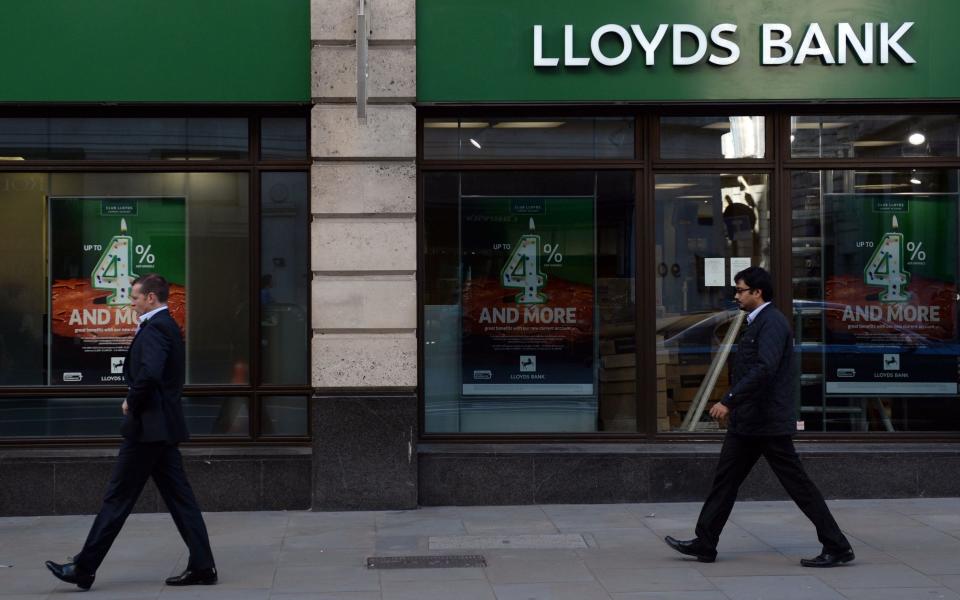Even if there is a recession, Lloyds’ shares are a steal

Markets continue to fret about the prospect of sticky inflation on one hand and rising interest rates and the risk of a recession on the other.
Bond and share prices are wobbling at the same time, not helped in Britain by uncanny echoes of the 1970s, when the end of the Barber boom, oil price shocks, inflation and confiscatory tax policies hammered bonds and stocks alike and made it hard to preserve capital, let alone accumulate it.
Whether the increase in capital gains tax and the windfall tax on oil are the end of the Government’s cash grab or just the start remains to be seen, but the public debt is still growing.
After a four-decade span when capital has had its wicked way with labour it is also possible – healthy, even, from the point of view of social cohesion – that the tables may be turning, to the detriment of corporate profits and potentially investors’ returns.
The question then is how portfolio builders can seek shelter.
As with all things in this column’s view, that takes us to valuation. The multiple of sales, earnings, profits and cash flow paid, or the dividend yield accepted, at the point of purchase is the ultimate arbiter of investment returns.
The lower the multiple, the greater the potential gains – provided, at least, that the business model remains sound and defensible, management is competent and the balance sheet sufficiently robust to see the firm through any degree of trouble.
This takes us, believe it or not, to a bank: Lloyds Banking Group, to be precise. Few tears will be shed by this column’s readers, but it is not much fun being a bank.
Regulators, politicians and the public still remember the grief caused and the bill footed because of the global financial crisis. Regulation is tight, customers are happy to switch between accounts and lenders; competition, especially from new fintech upstarts, is fierce.
Moreover, the world is swamped with debt, so growing your loan book without taking on risk is not as easy as it sounds, especially at a time when interest rates are still near historic lows.
Throw in fears of a recession and investors could be forgiven for asking why anyone would choose to be bullish on a bank. Well, you don’t have to be particularly bullish.
You just have to look at the valuation, which is so lowly, on the basis of earnings, book value and yield, that it feels like a disaster on the scale of 2007-09 is already priced into the stock. If things don’t turn out to be that bad, the shares look cheap. And if things go even vaguely right at any stage, the shares could look like a steal.
Income seekers may like the look of the 5.2pc forecast dividend yield, supplemented by share buybacks. Value hunters will latch on to the 57.5p a share of tangible net asset value, to which the shares trade at a 21.5pc discount, as if to already price in a major economic downturn.
Those who seek shelter may warm to the sub-100pc loan-to-deposit ratio and the 16.3pc common equity tier 1 ratio, as both suggest that the bank is financially robust and able to get through any cyclical downturn that comes its way.
Yes, times could get a lot tougher and bad debts could start to pile up again, but it feels like net interest margins have bottomed, at least for now, and analysts are already forecasting no growth in pre-tax profits out to 2025.
The valuation factors in a lot of potential pain already and it might not take a lot to deliver some positive surprises, given the lowly expectations.
This is not the case at a much greater number of companies, where multiples of earnings and book value are higher, yields lower, balance sheets less robust and forecasts for earnings growth more optimistic, so maybe Lloyds has the potential to be a port in a storm, at least for those investors who feel they may need one. Patient contrarians may now like to bank on Lloyds.
Questor says: buy
Ticker: LLOY
Share price at close: 45.14p
Russ Mould is investment director at AJ Bell, the stockbroker
Read the latest Questor column on telegraph.co.uk every Sunday, Tuesday, Wednesday, Thursday and Friday from 5am.
Read Questor’s rules of investment before you follow our tips.

 Yahoo Finance
Yahoo Finance 